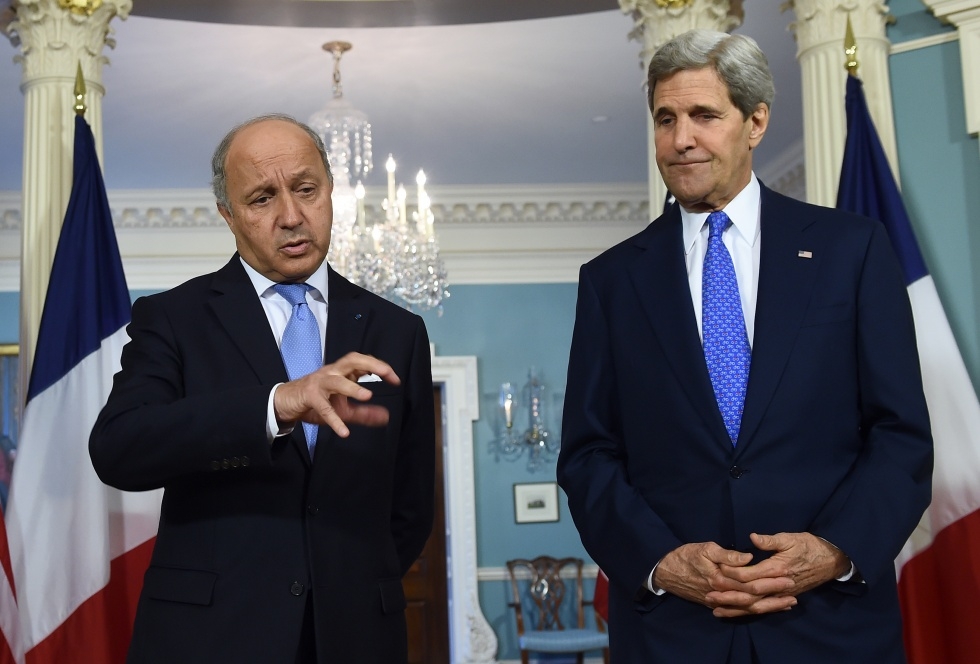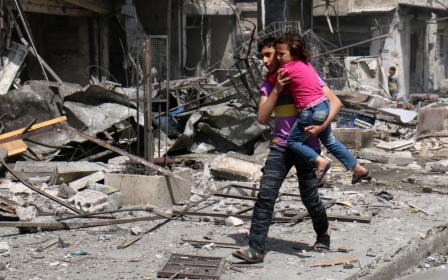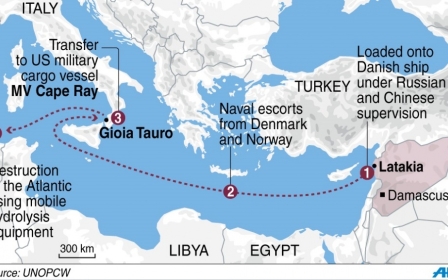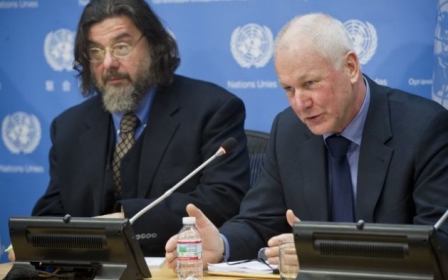French FM: Syria used chemical arms 14 times since October

The Syrian regime is believed to have used chemical weapons including chlorine in 14 attacks since late 2013, French Foreign Minister Laurent Fabius said Tuesday.
Fabius, who is on an official visit to Washington, also voiced France's regrets that US President Barack Obama had failed to unleash strikes on the Syrian regime as punishment for a sarin gas attack, saying it could have changed things on the ground.
Obama had threatened strikes after Syrian President Bashar al-Assad crossed a red line by launching a sarin attack in August near Damascus in which hundreds died. But in the end the US leader shied away from military action.
"We regret it because we think it would have changed lots of things ... but what is done is done, and we're not going to rewrite history," Fabius told a press conference in Washington.
He alleged, however, that "we have credible witnesses for the use, at least 14 uses... of chemical agents since October 2013."
New MEE newsletter: Jerusalem Dispatch
Sign up to get the latest insights and analysis on Israel-Palestine, alongside Turkey Unpacked and other MEE newsletters
While Assad has handed over some 92 percent of his chemical weapons stockpile for destruction, "we have lots of elements which lead us to believe that a certain number of these chemical weapons have been hidden," Fabius said.
'Evidence of chlorine use'
The 14 reported incidents showed that "in recent weeks, new, smaller quantities of chemical arms have been used, mainly chlorine," he said, adding that France was currently examining the evidence.
US officials asked about Fabius's allegations said they would have to check into the reports, but stressed they took any such accusations seriously.
But a senior administration official hit back at Fabius's regret that military strikes did not go ahead, pointing instead to the destruction of most of Assad's stockpile by a UN watchdog in past months.
"There is no evidence that a strike would have allowed us to remove that amount of chemical weapons," the official said, asking not to be named.
"So we continue to believe that was the right step, it was an effective step and it has enabled us to prevent Assad from using those chemical weapons to brutalize his own people."
Human Rights Watch said meanwhile Tuesday that it also had evidence Syria's government had used chlorine gas on three towns in mid-April in violation of the chemical weapons treaty.
The Organization for the Prohibition of Chemical Weapons which is overseeing the destruction of Syria's chemical arms stockpile has sent a mission to Syria to investigate the allegations.
Western officials said evidence gathered from the sites of the alleged attacks was now being examined by France and other countries and the results should be known "in a few weeks."
"We think there is a tactical use by the regime of chemical arms in certain key areas to unblock the ones held by the opposition," a Western official said, asking not to be named.
One problem is that chlorine has many legitimate uses, even though its use as a weapon is banned under international conventions. When used as a gas it has proved pretty volatile, so inspectors will have to rely on witness testimony.
Paris calls on UN to refer Syrian war to ICC
France Monday asked the UN Security Council to refer the war in Syria to the International Criminal Court for review of war crimes and crimes against humanity.
A draft resolution was distributed to the council's 14 other member states that will debate it Wednesday, and could vote on it next week, diplomats said.
Because Syria is not an ICC member state, the only way it can be referred to the court is through the Security Council.
UN rights chief Navi Pillay had already made previous calls for the ICC to review the war in Syria.
According to a copy of the resolution obtained by AFP, the Council calls on the court "to investigate all alleged violations of international human rights law since March 2011," when the crisis began.
The text references "the widespread violations of human rights and international humanitarian law by the Syrian authorities and pro-government militias" as well as those of "non-state armed groups."
In referencing the two camps and recent escalation of atrocities, including chemical attacks, systematic torture and stepped up use of barrel bombs on civilian populations, Paris hopes to convince all council members to refer the matter for review.
But many UN diplomats believe a veto will be exercised by Russia, a faithful ally of Syrian President Bashir al-Assad. Russia and its ally China have already vetoed three western resolutions since the beginning of the Syrian crisis.
Middle East Eye delivers independent and unrivalled coverage and analysis of the Middle East, North Africa and beyond. To learn more about republishing this content and the associated fees, please fill out this form. More about MEE can be found here.




